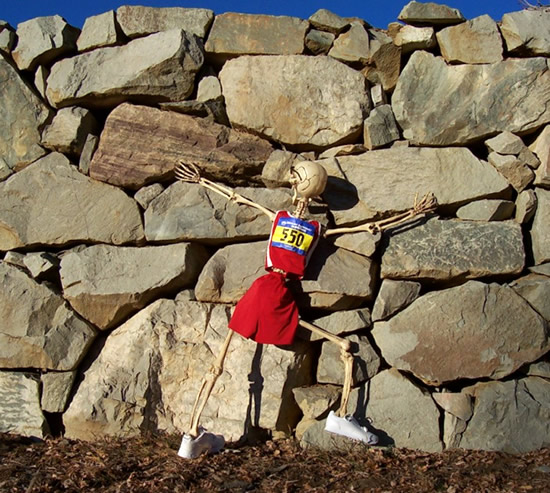Are you planning to fail your race?
“You’re not going to win,” the wise old runner told me. “Just remember that.”
I was at my very first marathon, on a dark and cloudless early morning in Hawaii before the race start, when I asked a nearby experienced runner if he might have some advice for me. “Stick to your plan,” he added. “Race as you trained and don’t go out too fast.”
Naturally, as this was my first marathon, I did nothing of the sort, beginning the first half of the marathon by running a beautiful and somewhat fast half marathon. I was feeling good until reaching the dreaded wall at mile 18. Some runners hit the wall, some bounce into the wall, and some, like me, crash into it full force and shatter every muscle-bone in their body until they limp, destroyed, across the finish line.
I was given sage advice and I ignored it. Four years later, a half-dozen ultra-marathons, dozens of marathons and half marathons, and a couple of Ironman triathlons later, I still occasionally forget the advice.
As the saying goes, “Those who fail to plan, plan to fail.”
Some people don’t like having a plan and they think it works for them. They go with the flow. They make up training and race strategy as they go along. And that might work for those runners with decades of experience.
For the rest of us, however, particular those of us who are a more mature athlete, you quickly realize that the indiscretions of youth and young body can’t continue and our aging athleticism just doesn’t hold up well under the “winging it” plan.
Whether your goal is to simply finish a half marathon, or to set a new personal record in the full marathon, the single most important way to achieving that goal is to have a plan.
So which plan works best?
If you ask 10 marathoners what plan works best, you’ll get 12 answers (sometimes, experienced runners can’t even agree with themselves). So how do you choose? How will you know what plan will work?
No one plan is perfect for everyone. But there are some important considerations when trying to decide what plan to chose.
Set a realistic time frame
If you have never, ever run a half marathon or spent more than 5 minutes running, you’re going to need a lot of practice before you attempt to run a marathon or even a half marathon. Make sure to pick a plan far enough in advance so you can build up to the race distance and time slowly. An experienced runner may need as little as 6 weeks to prepare, but most of us need considerably longer than that. The “sweet spot” for those with some race experience seems to fall into the 12-18 week time frame. For those with no marathon or half marathon experience, it could be as long as 24 weeks – or even longer depending on your health. If you’re not sure, do more than just ask your running buddies. In many cases, they will underestimate the time you’ll realistically need. Rather, ask a running coach for some advice. And, even then, ask more than one.
Find out what type of runner you are
 Are you someone who tends to go out fast, burn out quickly, and stagger to the end of a workout? Or are you someone who takes things so slow and easy you don’t push yourself? Do you prefer to run and walk, or just run? Are you a mid-foot runner, a heel-striker, barefoot runner, or don’t know? Do you own a heart rate monitor? Do you believe in time and heart rate training? Or are you a distance junkie? Do you prefer track workouts or trails? What type of shoes will you have? Do you know what types of shoes you should be wearing? As trivial as it may seem, all those factor into picking the correct plan.
Are you someone who tends to go out fast, burn out quickly, and stagger to the end of a workout? Or are you someone who takes things so slow and easy you don’t push yourself? Do you prefer to run and walk, or just run? Are you a mid-foot runner, a heel-striker, barefoot runner, or don’t know? Do you own a heart rate monitor? Do you believe in time and heart rate training? Or are you a distance junkie? Do you prefer track workouts or trails? What type of shoes will you have? Do you know what types of shoes you should be wearing? As trivial as it may seem, all those factor into picking the correct plan.
Are you a group runner or a solo runner? If you’re a group runner, many local companies such as local San Francisco company A Runner’s Mind have group runs and even academies to help you reach your goals. Any plan you might have should take those runs into consideration. If, however, you prefer to run solo, then you may need other forms of accountability to keep you on track during the rough patches.
And there will be rough patches.
Evaluate the tools you’ll have to train
Although there is still discussion among runners, many folks believe the most effective form of training for an endurance race is through the use of a heart rate monitor. With the plethora of devices today that can give us bio-metrics on the fly, to many it would seem foolish not to put such information to use. But, you might not have a heart rate monitor, or you might have something that doesn’t work well. Additionally, you may have injuries or previous knee issues which would prevent you from running long miles or 5 times a week. In those cases, you might need to find a plan that involves a lot of cross-training and pacing drills which don’t emphasize heart rate. No matter how effective heart rate may be, if you don’t want or simply can’t follow heart rate – or know yourself well enough to know you’ll never keep track – then using a plan based on heart rate is counterproductive. Also, if you have injuries or special needs, generic plans without cross-training might not fit.
Do you have the mental endurance? The support of friends and family? Will you have those tools available, or will you need to seek support elsewhere (such as running groups, forums, etc)?
Take stock of your “assets” and “liabilities” before picking a plan so that the plan can alleviate your “liabilities” or work within them.
When in Doubt, Stick to the Classics
 Hal Higdon has been helping runners finish races from 5k’s to ultramarathons since … well, since nearly from the beginning of time. His plans helped me finish the Comrades Marathon, a 56-mile, 12-hour-limited endurance race (the largest in the world) in South Africa twice. His plans are free and can be found at halhigdon.com.
Hal Higdon has been helping runners finish races from 5k’s to ultramarathons since … well, since nearly from the beginning of time. His plans helped me finish the Comrades Marathon, a 56-mile, 12-hour-limited endurance race (the largest in the world) in South Africa twice. His plans are free and can be found at halhigdon.com.
New training ideas come and go, but those that stick around have been proven by time. They might not be the absolute best plans for those planning to win the race. But the for the rest of us just racing the clock, they will, more often than not, work just fine.
Of course, if you can afford it and you live local to San Francisco, the RUN365 crew can help evaluate you, your personal goals, and help you finish feeling strong and happy.
But whatever plan you pick, make sure you can live with it. If you have a coach, make sure they can live with it, too.
Happy Running, and I’ll see you at the finish line!
If you have a favorite training plan, share your wisdom and knowledge in the comments below!



